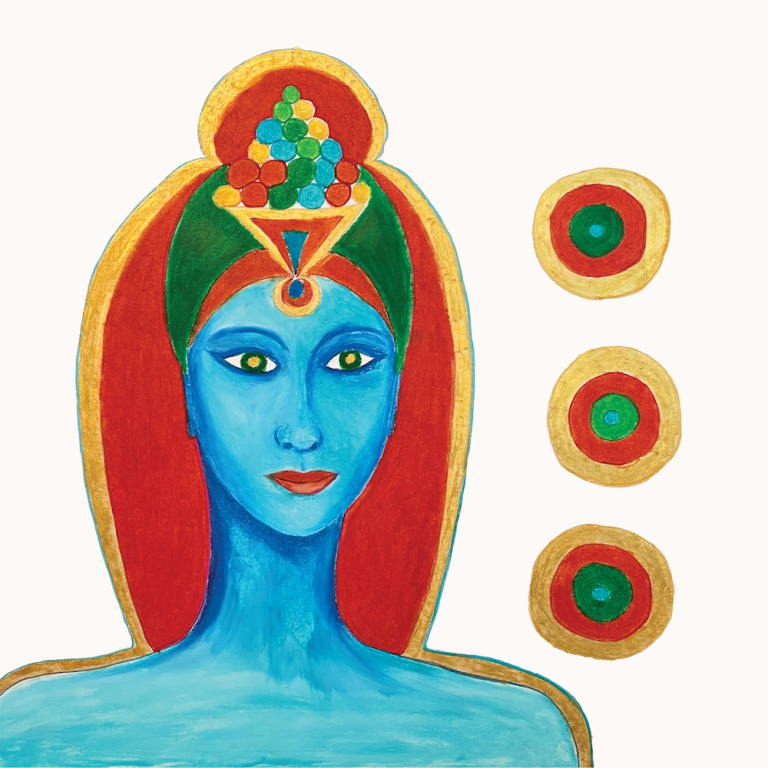From nothing comes something. Or, to be more particular to Natalie Rose LeBrecht, from silence comes music. For two weeks during the summer of 2019, the New York musician sat in her small music room at home and meditated silently. Ideas formed and generated from this rumination; “I came out of that bursting with the will to create new music,” she explains of the process. From there the music spilled out, cosmic and contemplative songs that often stretch toward the 10 minute mark. Hymnal organs and synths, choral multi-tracked voices, and woodwinds fluttering atop are the name of the game on Holy Prana Open Game, an almost incantatory album that invites you to get lost in its wide open spaces.
None of this music came about easily either. LeBrecht went for the hands-on approach, teaching herself to program an analog synthesizer’s timbres from scratch as well as how to record, edit, and mix the music she was making in her once silent meditation space. The end result wears this homespun feel close to its heart, the album capturing a searching tone; you can envision LeBrecht lost in a trance in her music room, starry drones surrounding and swirling about her.
Opening track “Home” is the album’s best offering, its extended wispy atmosphere going between swampy dark hues and heavenly light. Her lyrics read like instructions from a shaman or an ancient riddle: “Snake rattle shakes the shadows free / They dance like smoke wild in the breeze / Drink this potion, I dare you to try.” If it sounds a little new age for your liking, rest assured LeBrecht makes it work. Words have seemingly endless syllables and the way she wanders down the scale between chords is like you might find on a Weyes Blood record. The song’s coda in the final third in particular is where it gets interesting: like thunderclouds rolling in, booming drones enter the frame as the song deconstructs itself. The track evokes the haunted atmospherics of Sigur Rós’ Von while LeBrecht even manages to sound like lead singer Jónsi as her voice coos impressively high and long.
“Open” sets itself amidst the stars, and begins with what sounds like a black hole being ripped asunder. Frizzy synths burn like neon flames and woodwinds from longtime musical accompanist David Lackner sweep it into a sort of free jazz exploration. LeBrecht repeats phrases like “lives of light” and “now is here” like mantras of self-affirmation. The effect is beguiling at its best, but like “Prana” it does lose a certain drive and direction over its extended playtime, despite the searching nature of the album. These tracks are explorative musings and exercises, and they would probably hit best when under the influence of some psychedelic substance or in your own meditative trance. Otherwise, Holy Prana Open Game’s best effect comes from letting it wash over you, a sort of cleansing record to rebalance your aura.
Elsewhere on moments where LeBrecht reigns it in a little more, the results work pretty well. “Holy” takes a little while to find its stride, but a glimmering texture is produced eventually as plodding piano is set against shimmering guitar notes (courtesy of Australian guitarist Mick Turner, whose contributions on the album are nearly always perfectly matched to what LeBrecht sets up). A take on Atoms For Peace’s “Amok” is an unexpected addition to the tracklist (even for LeBrecht, who formed it through improvisation and editing); steeping it in rippling piano notes and adding her own words to Thom Yorke’s original lyrics, she reforms it into a perfumey message of hope.
If all of Holy Prana Open Game doesn’t quite click or settle well in your ears, that seems perfectly fine to LeBrecht. Though a long time in the making, this is an album of trying to capture that fleeting light of inspiration, aiming to put words to grasping the ineffable. She offers space for the listener to find something, even if it’s the inspiration to take their own time to sit in silence like she did. “Don’t be afraid of the quiet, or vast open space / You are not lost when you are still,” she counsels on “Prana”.
At the end she finds a new space of sorts. Final track “Game Over” strips away the instrumentation and over a bed of heavenly choral voices LeBrecht sings of rebirth and renewal. “Like a retired actress, you’ve left the stage / The road is now unpaved / Just look up at the sky and never really die,” she intones. Whether she’s directing her gaze upwards to the pearly gates or just to the future, the cycle nonetheless is complete; the album ends and silence returns. Something came from nothing and once again LeBrecht finds herself at a new starting point.

